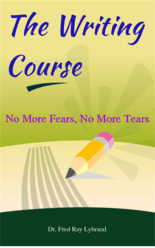Why is writing so hard? Is it even fixable?
Honestly, the greatest hindrance to growing as a writer (or growing our children as writers) is the simple theory out there that writing really is something you can’t learn— you either can or you can’t write, that’s it! Of course, this is about as big a bunch of baloney as you find at any sandwich shop in any major northern city.
Writing is about language. One of the main ways we use language is by talking. No one seems to think that talking is un-learnable. We learn to talk by talking. We learn to write by writing.
Now, I’m not saying it isn’t hard to learn to write better. Writing is easily the most difficult subject out there. In a simple paragraph you can have hundreds of decisions to make in word choice, punctuation, grammar, etc. Writing also needs to happen at a dizzying speed. Yet, our design as humans means we have been made for it; we have an ‘Instinct for Writing’ (see Pinker).
The challenge is to recognize that learning anything isn’t easy (at first). In fact, the way I like to say it is
EVERYTHING IS HARD BEFORE IT’S EASY, BUT IT’S EASY ONCE YOU KNOW HOW
In our approach we teach folks to start with writing how they speak. This isn’t the end of the process, but it does tap into your child’s innate ability to work with language. We don’t want to write like we speak, BUT it is a great way to start. Once those words are down on paper it’s just a matter of going back through them and making a few improvements.
Almost anyone can do this, but they simply must keep in mind that learning almost always involves frustration. Get over it. The frustration doesn’t last as the skill develops. Your student’s frustration is a sign she needs to learn, not a sign that she can’t.
I have a free gift that might help a lot. Get it by clicking Endless Writing Prompts. You are on a good course…the more they actually write and then tweak, the faster they will learn and succeed.
Does it really go without saying that we need some better writers in this world?
Off to learn,
Dr. Fred Ray Lybrand


